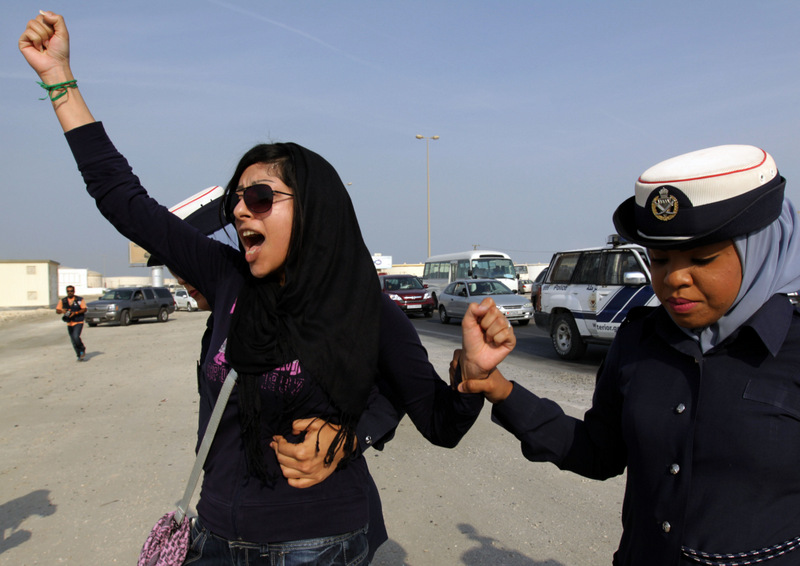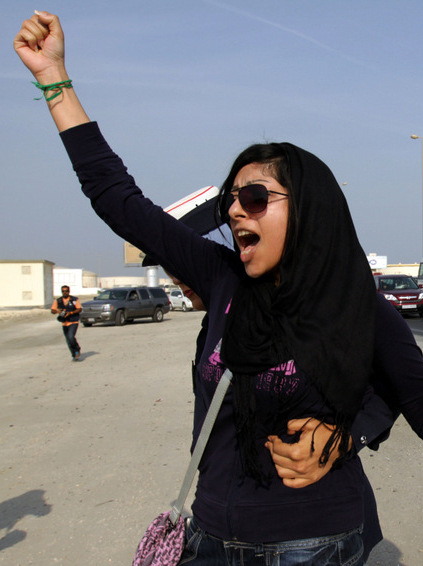
Bahraini pro-democracy activist Zainab al-Khawaja has been released from jail after serving nearly one year for multiple charges, including participating in an illegal gathering and insulting police, but the question that remains is what her future of activism will look like as she continues to face pressure to back down.
“One year of prison is nothing,” she said after her release on Feb. 16, reported BBC. “We have a cause. This will not stop us.”
Al-Khawaja faces two more trials. She was sentenced to four months in jail in January on a charge of “destroying government property,” in which she was accused of ripping a photo of King Hamad in May 2012.
Her father, Abdulhadi al-Khawaja, a human rights activist currently serving a life sentence, also faces two more trials.
Maryam, her sister and acting president of the Bahrain Centre for Human Rights, said Zainab might be arrested again.
“I haven’t been able to see her yet, but the only reason she was released was because she finished her sentence,” Maryam told MintPress News from Denmark on Wednesday. “She could still be sent back to prison.”
“She wants international people to focus on the other 3,000 people who were imprisoned, too. She will continue to do what she has been doing, which is peacefully protesting the situation here in Bahrain,” she continued.
Zainab, who is popular on Twitter under the profile @AngryArabiya, said the international media should focus on the 3,000 prisoners still behind bars in Bahrain on political charges.
Since the start of the uprising in Bahrain’s capital Manama in February 2011, Zainab has been detained several times.
She has refused to appeal to higher courts, saying Bahrain’s judiciary is controlled by the government.
Her release came a day after thousands of Bahrainis rallied to mark the third anniversary of the uprising, in which a police officer also died after a bomb exploded.
Amnesty International said she had verbally defended a fellow prisoner who was “insulted and humiliated” by a prison guard at the Isa Town women’s detention center, south of Manama, in June 2013.
“The Bahraini authorities must not place Zainab Al Khawaja behind bars yet again,” Amnesty Middle East and North Africa Deputy Director Said Boumedouha said in a statement. “She has long been a thorn in the side of the Bahraini government, which has repeatedly found excuses to ensure she remains locked up in order to silence her.
“The authorities must take urgent steps to clear Zainab Al Khawaja’s name once and for all. Her convictions must be overturned and all outstanding charges dropped as a matter of urgency. Activists must be allowed to freely express their opinions without fear of intimidation, harassment or arrest. All Bahraini prisoners of conscience must be released immediately and unconditionally, and the right to freedom of expression and assembly respected,” Boumedouha said.
Multiple attempts to reach Zainab by phone were unsuccessful.
Tensions persist in Bahrain
Protests sprang up across the island nation on Feb. 16, the third anniversary of the 2011 uprisings, and witnesses reportedly threw stones at police, who fired tear gas into the crowds, according to The Independent.
“Some villages saw rioting, vandalism and the targeting of policemen,” a statement from Bahrain’s Interior Ministry said, The Independent reported. “This required police to respond to these criminal acts with legal means.”
Problems between the majority Shiite population and the minority Sunnis, who also control the government’s monarchy, have not yet been resolved. With Saudi military help, Bahrain stopped the demonstrations that began in 2011, which were inspired by the Arab Spring uprisings sweeping across the Middle East at the time.
U.N. Secretary-General Ban Ki-moon said he was concerned about reports of clashes between demonstrators and security forces on the third anniversary, and urged the authorities to act in strict accordance with their international human rights obligations.
A tiny Gulf island nation of 1.7 million people, Bahrain has been in a state of turmoil since the 2011 revolt. The government says it has implemented some reforms recommended by international mitigators and that it is willing to consider more of the protesters’ demands.
Shiites want greater democratization, including cabinets chosen by an elected parliament rather than appointed exclusively by the king.
They also call for an end to alleged discrimination in jobs, housing and other benefits. The government denies any policy of marginalizing Shiites.
Meanwhile, Maryam, Zainab’s sister, said that although she is worried about her sister being jailed yet again, and given the fact her father will probably never be released and her uncle is serving a five-year prison term, too, she is committed to highlighting the plight of the Bahraini people living under authoritarian rule there.
“She may be on the inside again, but I am on the outside — so we can play different roles in our cause,” she said.
A Front Line Defenders interview with Zainab al-Khawaja prior to her imprisonment.


